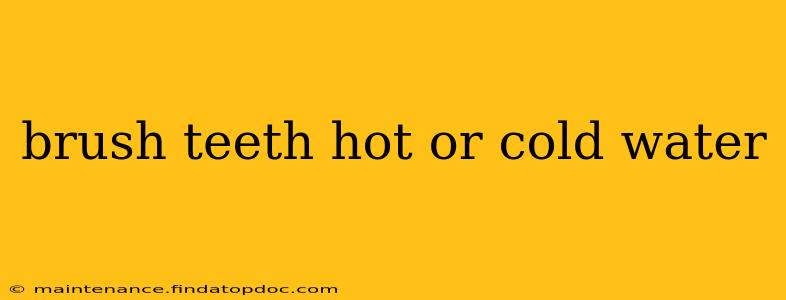The age-old question: should you brush your teeth with hot water or cold water? The answer isn't a simple yes or no. While there's no definitive scientific consensus declaring one superior to the other, understanding the nuances of each can help you choose the best option for your oral health. This guide will delve into the pros and cons of using hot and cold water for brushing, answering frequently asked questions and ultimately empowering you to make the informed choice for your smile.
Is it Better to Brush Your Teeth with Hot or Cold Water?
The ideal water temperature for brushing your teeth falls within the lukewarm range. Both excessively hot and excessively cold water can have drawbacks. Let's break it down:
Cold Water: Many people prefer cold water for brushing because it provides a refreshing sensation and can help to numb any sensitivity in teeth and gums. However, very cold water may increase sensitivity in some individuals.
Hot Water: Hot water can be uncomfortable and potentially damaging to your gums and soft tissues in your mouth. It can also affect the effectiveness of your toothpaste, potentially altering its chemical properties.
What Happens if You Brush Your Teeth with Hot Water?
Brushing with excessively hot water can lead to several undesirable outcomes:
- Gum Irritation: The heat can irritate and inflame your gums, potentially leading to discomfort and even bleeding.
- Tooth Sensitivity: While some find hot water soothing, it can exacerbate sensitivity in individuals already experiencing this issue.
- Altered Toothpaste Effectiveness: Some toothpaste ingredients may react differently to hot water, potentially reducing their efficacy in cleaning and protecting your teeth.
What Happens if You Brush Your Teeth with Cold Water?
While generally safer than hot water, brushing with very cold water also presents some potential issues:
- Increased Sensitivity: For those with sensitive teeth, the sudden cold can cause discomfort or a sharp, shooting pain.
- Less Comfortable Experience: Many find cold water less pleasant to use, making the twice-daily brushing routine less enjoyable and potentially leading to inconsistent brushing habits.
Does Water Temperature Affect Toothpaste?
Yes, water temperature can potentially influence the effectiveness of your toothpaste. Extreme temperatures, both hot and cold, can affect the chemical properties of some toothpaste ingredients, potentially reducing their ability to clean and protect your teeth. Lukewarm water is the most likely to maintain the toothpaste’s optimal properties.
What is the Best Temperature to Brush Your Teeth?
The optimal temperature for brushing your teeth is lukewarm. This temperature is comfortable, avoids irritation, and is unlikely to negatively impact the effectiveness of your toothpaste. It strikes a balance between the refreshing feel of cold water and the potential harm of hot water.
Can Hot or Cold Water Damage Your Teeth?
While neither hot nor cold water will directly damage your teeth in the short term, consistently using excessively hot water can lead to gum irritation and increased sensitivity over time. Excessively cold water, while less damaging, can also increase sensitivity for some individuals, potentially making brushing an unpleasant experience.
Conclusion: The Goldilocks Approach to Brushing
The best approach to brushing your teeth is to use lukewarm water. This strikes a balance between comfort, effectiveness, and the avoidance of potential damage to your gums and teeth. Choosing the right temperature, alongside proper brushing technique and regular dental checkups, is crucial for maintaining optimal oral health. Remember, consistency and a gentle touch are key to a healthy and happy smile.
